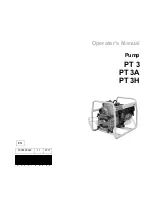
16
ENGLISH
– Failure of important pump or unit
functions,
– Causing personal injury due to
electrical or mechanical causes.
Safety rules for the operator
Local regulations for the prevention of
accidents must be observed.
Dangers caused by electrical energy
must be excluded. Local or general
regulations [e.g. IEC, VDE, etc.] and
directives from local energy supply
companies are to be followed.
Safety rules for inspection and
installation work
The operator must ensure that all ins-
pection and installation work is car-
ried out by authorised and qualified
specialists who have carefully studied
these instructions.
Work on the pump/unit must be car-
ried out only with the machine swit-
ched off and at compete standstill.
Unauthorized modification and
manufacture of spare parts
Alterations to the pump or installation
may only be carried out with the
manufacturer's agreement.
The use of original spare parts and
accessories authorised by the manu-
facturer will ensure safety. The use of
any other parts may invalidate claims
invoking the liability of the manufactu-
rer for any consequences.
Unauthorised operating methods
The operating safety of the pump or
installation supplied can only be gua-
ranteed if it is used in accordance
with paragraph 1 of the operating
instructions. Under no circumstances
should the limit values given in the
data sheet be exceeded.
3
Transport/Interim
storage
The pump contains
electronic components
and must be protected
against moisture from
outside and mechani-
cal damage (shock /
impact) (Fig. 7). It must
not be exposed to tem-
peratures outside the
range -10 °C to +50 °C.
(Fig. 7).
4
Description of
pump/accessories
Products delivered
– Complete pump
– 2 flat gaskets,
– Installation and operating in-
structions
Pump description
In the wet-running pump all rotating
parts are surrounded by the flow
medium, including the motor rotor.
A shaft seal, which would be subject
to wear and tear, is not required. The
pumping medium lubricates the fric-
tion bearing and cools both bearing
and rotor.
No
motor overload protection
is
required.
Even the maximum overload current
cannot damage the motor. The motor
operates non-overloading.
ATTENTION!
Summary of Contents for Wilo-Star AC
Page 2: ......
Page 3: ......
Page 4: ...N L N L N L N L 1 230 V 50 Hz a b c N L...
Page 5: ......
Page 106: ...106 E HANIKA Y...
Page 107: ...107 E HANIKA 1 3 7 10 C 50 C 7 4 2 N...
Page 109: ...109 E HANIKA ST RSG 25 5 Din 4751 2 3 1 4 5 86 x 76 x 2 0 mm EP...
Page 110: ...110 E HANIKA 3 2 VDE 0730 1 3 05 VV F 3 G 1 5 90 C 6 5...
Page 111: ...111 E HANIKA 6 9...
Page 112: ...112 E HANIKA 15 30 3 1 7 8 9...
Page 113: ...113 E HANIKA WILO 9 M...
Page 116: ...116...
Page 117: ...117 1 3 7 10 50 7 4 8 1 2 3 40 50 50...
Page 118: ...118 S2R 3D ST RSG ST RSG AC 20 I O AC I I inline inli ne AC O O offline S2R 3D ST RSG 25 5...
Page 119: ...119 2 3 1 4 5 86 x 76 x 2 0 3 2 12 1 030 81 IEE H 05 VV F3 G 1 5 90...
Page 120: ...120 6 6 6b 6c 5 6 c 9...
Page 121: ...121 15 30 1 3 7 8 9...
Page 122: ...122 WILO 9...
Page 139: ...139 40 C 50 C 0 05 95 C 0 3 110 C 1 0 S2R 3D 300 100 0 01 VDI 2035 1 1 WILO 2...
Page 140: ...140 IEC VDE 1 3 7 10 C 50 C 7...
Page 142: ...142 5 DIN 4751 2 3 1 4 5 86 x 76 x 2 0 EP 3 2 VDE VDE 0730 1 3...
Page 143: ...143 H 05 VV F 3 G 1 5 90 C 6 5 6...
Page 144: ...144 9 15 30 3 1 7 8 9...
Page 145: ...145 WILO 9...
Page 146: ...146...
Page 147: ...147...
Page 148: ...148...
















































